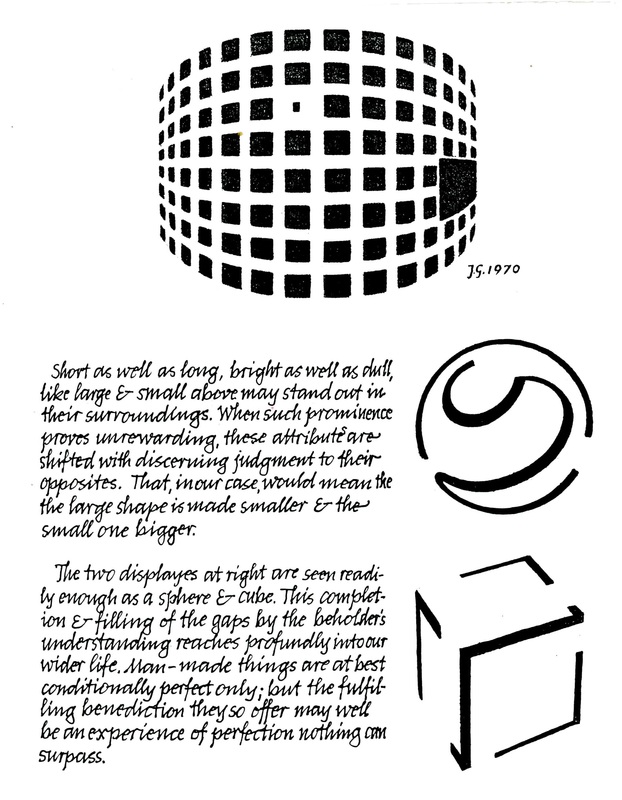|
The FINAL week -- with summary conclusions for "What is a beautiful thing?" and "Why pursue beauty?" and the meaning of true fulfillment for our leisure time. F. The Definition – What is a Beautiful Thing? Just as a thing is interesting when it engages the participation of the intellect, so is beauty its ability to engage us through the senses which, in our present line of interest, is the sense of sight. If we have reached agreement on my live demonstrations, two things will have been made clear.
display. It is the ability to look at ourselves while looking at a thing. G. The Purpose – Why Do We Pursue It? If we ask what makes a beautiful thing desirable to have, we get invariably the reply: “It pleases.” So it often does, but decidedly not always:
Literature, of all the arts, uses the comprehending intellect as if it were one of our senses. For, the reading eye alone would see page by weary page a single basic pattern endlessly repeated. But form and composition speak at first to the brain itself as if it were purely an organ of reception – a retina and eardrum of the mind. What unfolds in all my three examples are terrifying tragedies. To be gratified or well-pleased with them would be indeed satanic pleasure – a diabolical amusement. But, even while the heart is saddened, these works can so utterly engage all our mind and feeling that no foreign desires are able to intrude, and no distractions tarnish, the experience. Thus we learn through them a perfection of fulfillment.
The Purpose – Why Pursue Beauty? (cont’d)
2. But to love and learn about the Arts we have to measure up to them. We have the right to assess any work against the artist’s claim – his promise, if you will – that he is showing it to us because it will be a first rate thing to see. Yet, as viewers we must have good will, seek to un-learn our prejudices, and shed the common failing of ill-tempered and pedantic carping. For these will surely shut the doors on art. Besides good will, and by the instrument and reason of good will, we have to learn to open our eyes and to develop a clear mind, to be – to the best of our ability – a Noble Viewer for the artist’s work.
The Sciences – and here we must include Philosophy among them – are also fulfilling and enriching. But the Fine Arts and the Sciences cannot take one another’s place.
The Arts, however, can transport us to another world where our daily troubles matter little, and where we are refreshed as if we went on a vacation.
but because it simultaneously enriches and fulfills and restores our weary spirit, in a compact – one almost wants to say “efficient” – form that nothing else can quite achieve. 4. Finally, works of art can give to us this true refreshment and unburdening from our common cares in ways no artifact can altogether equal. H. A Change of Pace Rather than Escape
weaken him in the execution of his tasks. We assume therefore that ugly surroundings damage man’s ability to perform his proper work in life. Yet the unimaginable hell of a world entirely devoid of art – despite our inner city slums – still remains, I hope, mostly outside of human ken. But we are not prevented by our dependency on art from also wanting the truth of science and the reality in which it operates. We are not put to flight by reality. 2. The escapes of mindless thrills and pleasures cannot provide this change of pace we need for our restoration. For, largely disengaged intellects and sensibilities mean a relaxation of no pace at all.The mind-deadening effects of numerous television offerings – that is, the resulting sluggishness toward mental action – show that downward self-fulfillments as a class, far from giving us refreshment, put us beyond the reach of any restoration. 3. But the Arts demand of us a diligence and an attention that will bring us true enrichment instead of a mere land of dreams. For they alter solely the use we make of our faculties, and thus sharpen them into alertness, instead of rendering them numb. Leisure time is time which truly belongs to ourselves, and we should get from it all the benefits we may. The Arts are more suitable than almost any other instrument for gaining such a purpose. Johannes H. von Gumppenberg Lancaster, PA October 24, 1995
0 Comments
Leave a Reply. |
A Blog containing longer text selections from essays by Johannes, on art, philosophy, religion and the humanities, written during the course of a lifetime. Artists are not art historians. People who write are not all learned scholars. This can lead to “repeat originality” on most rare occasions. When we briefly share a pathway of inquiry with others, we sometimes also must share the same results.
Categories
All
Archives |
| von Gumppenberg | Johannes Writes |
|
|




 RSS Feed
RSS Feed